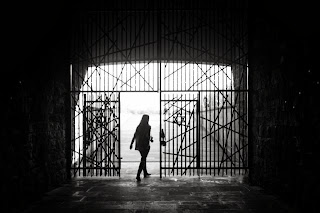After the football game we went to Dachau concentration camp, which resides just 16 km outside the city of Munich. It opened in 1933 and was the first Nazi concentration camp initially intended to hold political prisoners. When the camp opened, it was intended to hold up to a maximum of 5,000 prisoners, however with the passing of the Nuremberg Laws, capacity skyrocketed as Jehova's Witnesses, homosexuals, and emigrants were sent to the camp. When you enter Dachau, the gate bears its motto "Arbeit macht frei", which translates to "work shall set you free". This propaganda trivialized the camps original purpose as forced labor and re-education of prisoners. In actuality forced labor was used as a method of torture in a place where prisoners lived in fear of brutal treatment including standing cells, floggings, tree or pole hanging, and standing at attention for extremely long periods. After Kristallnacht, the incarceration of Jews at the camp skyrocketed. It is estimated that 200,000 prisoners were detained at Dachau, one third of the prisoners were Jewish, and over 30,000 reported deaths. With Nazi opposition closing in and overcrowding of the camp, prisoners were murdered and a typhus fever epidemic broke out. On April 29, 1945 the Dachau concentration camp was officially liberated by U.S. Army troops.
Today the memorial is free to all visitors and takes visitors through the path of new arrivals to the camp. Two of the barracks were re-built while the remaining 32 barracks are indicated by concrete foundations. The memorial also includes four chapels for the various religions represented among the prisoners.
It is truly eerie to visit a historically terrifying place that now seems so peaceful. Walking around the Dachau memorial site is an intense experience, and I began to cry almost immediately when entering.
Entering Dachau concentration camp
"May the example of those who were exterminated here between 1933 - 1945
because they resisted Nazism help to unite the living for the deference of peace
and freedom and in respect for their fellow men"
Rebuilt barrack on the left
Looking down the rows of concrete outlined barracks
Guard tower and security measures: 4 foot deep ditch, electrically charged barbed
wire on the ground and wall, and river just outside the wall
Entrance to crematory
Former maintenance building at the camp
Painting originally by a prisoner of Dachau depicting overcrowding of the barracks
The Mortal Agony of Christ Chapel - the position of the chap and the open circular form
was designed to symbolize the liberation from captivity by Christ
Jewish Memorial
View looking up inside the Jewish Memorial
The Protestant Church of Reconciliation.
The broken and irregular ground plan was designed in juxtaposition
to the ordered terror and uniformity of the concentration camp
Lighting a candle inside the protestant church
The Russian-Orthodox Chapel "Resurrection of out Lord"
To conclude our trip, we also went to see the BMW Welt Museum, which was designed by Coop Himmelb(l)au - the firm Brandon is currently working for in Vienna.
Cheesy bike photo













































No comments:
Post a Comment